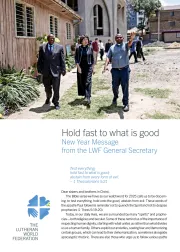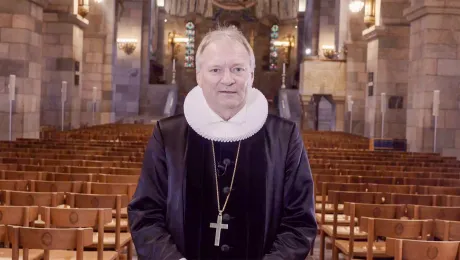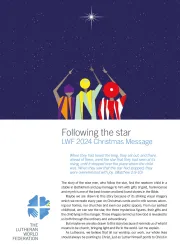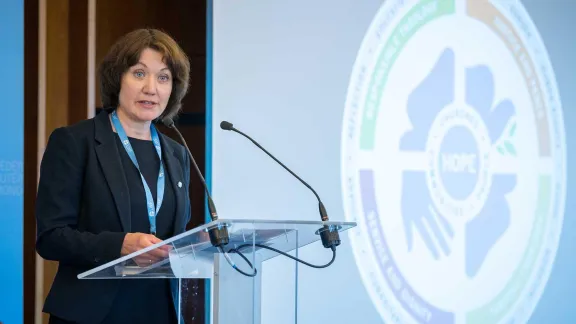
LWF general secretary Rev. Dr Anne Burghardt presents the new LWF strategy for the period 2025-2031. Photo: LWF/Albin Hillert
‘Sharing Hope: Empowering Churches, Impacting the World’
(LWI) - A strategy that calls on the global communion of Lutheran churches “to bring credible hope to people in a polarized and deeply divided world.” During its first full meeting since members were elected at the Kraków Assembly last September, the Lutheran World Federation (LWF) Council unanimously approved a new strategy that will guide its work over the coming seven-year period.
Titled “Sharing Hope: Empower Churches, Impacting the World,” the strategy is grounded in and focused on hope, said LWF General Secretary Rev. Dr Anne Burghardt. This is not a “not a vague, wishful ‘hope’ for better times, but a hope that is firmly rooted in faith and clearly visible through our actions.”
“It reminds us of some of the basic principles of how we understand the gospel and live out our faith. Being liberated by God’s grace, we are called to protect human dignity and the creation, to create welcoming and inclusive spaces, and to empower churches and communities to provide hope in words and deeds,” added the general secretary.
The new strategy has been developed based on directions from the Kraków Assembly and extensive consultations with church leaders, Council members, related agencies, ecumenical partners, and LWF staff.
It identifies four strategic priorities - Responsible Theology, Thriving Churches, Justice and Peace, and Service and Dignity – representing the main areas of the LWF’s work. In the strategy document, each of the four priorities begins with a context analysis and a ‘vision for change’, followed by practical action points that will shape the work of the LWF.
Our hope is that the member churches are even more strongly connected to the global communion.
LWF General Secretary Rev. Dr Anne Burghardt
LWF President Bishop Henrik Stubkjær said the strategy builds on the “conviction that, as a global communion we are called to bring credible hope to people in a polarized and deeply divided world.” We also believe, he added “that we must focus our efforts on empowering people to be signs of hope through words and deeds, bringing peace and healing, working for justice and reconciliation.” The theme of this year’s Council meeting, “Abound in Hope” (Rom 15:13) is linked to the central message of hope found in the strategy.
Responsible Theology, Thriving Churches
The first priority on Responsible Theology deals with the broadening of understanding and engagement with Lutheran identity, as well as deepening reflections on holistic mission and the role of the churches to offer a prophetic voice in the public space. It also emphasizes the work for Christian unity and the priority of theological education and formation.
The second priority entitled Thriving Churches focuses on relations between the 150 churches that make up the global communion. It also explores ways of strengthening leadership formation, with a focus on good governance, inclusion and respectful dialogue, as well as working for stronger intergenerational engagement.
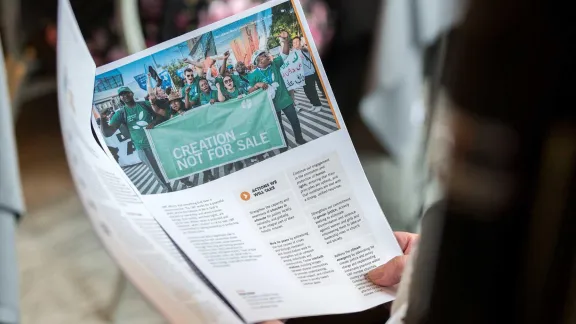
A woman reads a pre-print of the new LWF strategy as presented to the Council. Photo: LWF/Albin Hillert
Justice and Peace, Service and Dignity
The third priority on Justice and Peace highlights the advocacy work of the LWF, which includes strengthening the capacity of churches to raise their voices locally against injustices and engaging globally with the United Nations and other international organizations to strengthen the promotion of human rights, particularly in the areas of gender justice and tackling the climate emergency. It also includes a strong focus on peacebuilding and reconciliation, calling for the building of bridges between people of diverse religious and cultural identities.
The fourth priority on Service and Dignity focuses on the work to support vulnerable people affected by crises or emergencies, strengthening the disaster preparedness of communities and providing a holistic response to their practical and psychological needs. It pledges to promote action for climate resilient livelihoods and to strengthen support for all people on the move across departure, transit and destination countries. The Department for World Service, which leads the LWF’s humanitarian work, is also launching its own strategy which is in line with LWF strategy and develops these priorities in more detail.
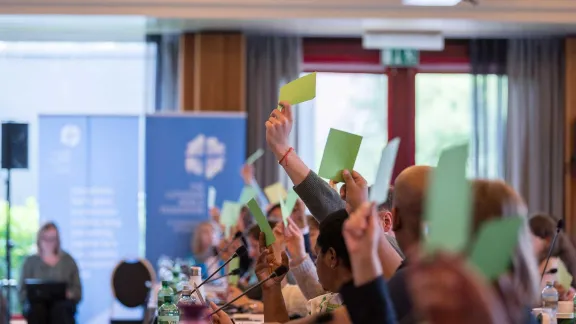
Council Members raise green cards to vote to approve a new LWF strategy for the period 2025-2031. Photo: LWF/Albin Hillert
The LWF strategy concludes with a focus on sustainability and strengthening cooperation with related agencies and partner organizations, including other churches and faith communities. “We know that working together to respond to emergencies or address the root causes of suffering and injustice can be a powerful tool for achieving these goals,” it says.
LWF General Secretary Burghardt expressed the hope that the Council members would share the new strategy with their churches, with the goal of inspiring their work and building closer connections. “By the end of this strategic period, our hope is that the member churches are even more strongly connected to the global communion and feel that they can be proud of its achievements,” she said.
